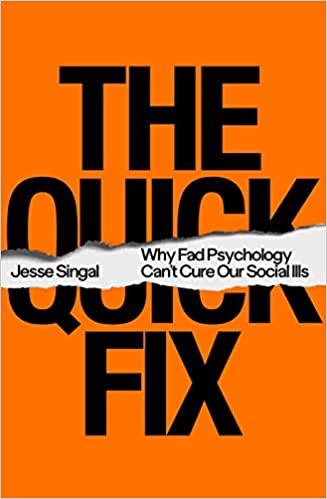The Quick Fix
Full Title: The Quick Fix: Why Fad Psychology Can't Cure Our Social Ills
Author / Editor: Jesse Singal
Publisher: Farrar, Straus and Giroux, 2021
Review © Metapsychology Vol. 25, No. 33
Reviewer: Christian Perring
Jesse Singal covers various ways in which theories in social psychology have been proposed as solutions for social problems. These include ideas about boosting self-esteem, the benefits of power-posing, positive psychology, the crucial nature of grit as a character trait, bias tests, and the effectiveness of nudging. He examines the science behind these theories, and the effectiveness of the programs built on them. Uniformly, he finds that the science is oversold and often very weak.
So the programs that build on those theories are almost bound to be problematic. The trends for these ideas sometimes get a great deal of institutional support from government, universities, and private entrepreneurs. It is very tempting to think that if we could only manipulate some aspect of people’s thoughts or emotions, then we could dramatically improve society. Singal’s overall message is that there are no quick fixes. To make real improvements to society, we need to make real changes in how society is structured.
Singal does an impressive job at examining the science — the hardcopy book has 33 pages of notes, and he sets out his points in plain language that makes good sense. But note that Singal does not have a graduate degree in psychology. He is a journalist, not a scientist. But he specializes in controversies in science and medicine. He naturally focuses on topics that are controversial, and gained some for his 2018 piece for The Atlantic, When Children Say They’re Trans. His main job is at New York magazine, and he co-hosts the podcast Blocked and Reported. He performs the audiobook of The Quick Fix himself.
Singal’s tendency is to be sympathetic towards skeptical stances. He often quotes psychologists who have unmasked fakery and hokum in psychology. One gets the impression that most of social psychology does not stand scrutiny — he comes close to saying this in the chapter on the replication problem in psychology, though he also holds out hope that new researchers in the field will avoid the mistakes of the past and build their theories on a more solid foundation.
Those who have followed social psychology over the decades will be used to the need to take the claims of the field with a large pinch of salt.
Aside from the particular issues within psychology Singal addresses, his focus on how psychology gets picked up by wider trends in society. Sometimes the psychologists seem more than happy to go along with this, especially when they financially profit. But at other times, they seem alarmed that they lose control of their ideas and they see them warped and over-extended in aid of goals they don’t agree with. TED Talks can go viral and really promote a psychologist’s ideas, but they require a slickness and simplification that goes against the complexity of science. Trade psychology books can do well, and it is possible to get in more detail there. But once an idea is popular, many other writers will pick up the idea and write books themselves. So the fad takes off. As history has shown, there have never been any “magic bullets” found in psychology, though often these theories contain a germ of truth that can get lost amid the hype.
The Quick Fix is a valuable book, addressing a wide range of problematic social psychology and clinical psychology. Singal has interviewed many key figures, read their work, and provided a skeptical guide. Next time readers hear about a new “discovery” in social psychology that will change the world, they will be appropriately dubious.
Christian Perring is editor of Metapsychology Online
Categories: Psychology
Keywords: psychology, fads

